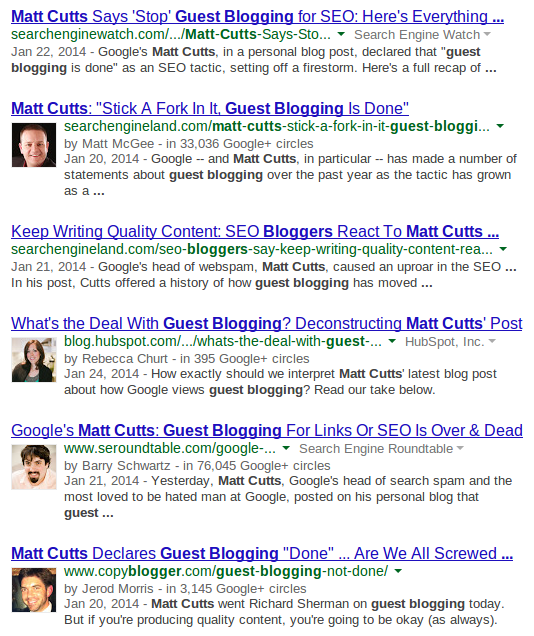When it comes to Google and Search Engine Optimization, Matt Cutts is no stranger. Having worked at Google for fourteen years, Cutts knows all that there is to know about search engines. Apart from that, he also happens to be the subject of a good number of internet memes.
So when Matt Cutts recently wrote an article titled The Decay and Fall of Guest Blogging for SEO, the internet went wild. What could this mean?
Matt Cutts on Guest Blogging and SEO
The Action
To cut the long story short, this is what Cutts had to say:
“Okay, I’m calling it: if you’re using guest blogging as a way to gain links in 2014, you should probably stop. Why? Because over time it’s become a more and more spammy practice, and if you’re doing a lot of guest blogging then you’re hanging out with really bad company.”
Also:
“So stick a fork in it: guest blogging is done; it’s just gotten too spammy. In general I wouldn’t recommend accepting a guest blog post unless you are willing to vouch for someone personally or know them well.”
Lastly:
“I just want to highlight that a bunch of low-quality or spam sites have latched on to “guest blogging” as their link-building strategy, and we see a lot more spammy attempts to do guest blogging. Because of that, I’d recommend skepticism (or at least caution) when someone reaches out and offers you a guest blog article.”
And to get his point across, he also re-shared some videos, such as this one:
The Reaction
As expected, Cutts’ blog post left a lot of people worried. Many, many, many people.
The Implications
Question is, what exactly did Matt Cutts mean when he declared that “guest blogging is done”?
In simple words, Matt Cutts did not attack guest blogging per se; he chose to attack web spam disguised as guest blog posts. He distinguished between good and bad guest blog posts, and sought to declare the latter as wrong.
Search engine algorithms are dynamic and ever-evolving. With each update to its algorithm, Google intends to produce more relevant search results for its users. However, amidst such dynamic algorithms, one thing remains constant: quality content.
Yet, the minute a good technique comes to the fore that can be used to produce legitimate content, its black hat variant also surfaces. For each genuine guest blogger out there, there are ten spammy content mills. Obviously, if quality content is to be promoted, newer algorithms need to be introduced.
One such measure devised by Google, for example, is Authorship, wherein search results show a snapshot of the content author.
Such author snapshots have many benefits of their own. Not only do they results in higher click-through-rates, but they also make the content more trustworthy. Furthermore, the value of the content can be assessed from the authority of the author’s Google+ profile.
Matt Cutts’ recent blog post about shady guest blogging techniques is just another step towards the improvement of the search algorithm and the elimination of spammy results.
Guest Blogging: The Right Way
Guest blogging still continues to have its own share of benefits, and if done the right way, it can yield good results as well as offer genuine quality content.
In a nutshell, this is what Cutts meant:
| NOT GOOD | GOOD |
| Using guest blogging to sell links (“Gimme my dofollow pls kthxbai”) | Using guest blogging to create quality content |
| Black hat tactic to amass links and fool search engines | Encouraging a diverse set of writers to produce content that appeals to the readers |
| Disguising poor quality nonsense as guest blog posts | No spam. No junk. Just A+ content. |
Conclusion
Once again, to quote Cutts himself:
“I’m not trying to throw the baby out with the bath water. There are still many good reasons to do some guest blogging (exposure, branding, increased reach, community, etc.). Those reasons existed way before Google and they’ll continue into the future. And there are absolutely some fantastic, high-quality guest bloggers out there. I changed the title of this post to make it more clear that I’m talking about guest blogging for search engine optimization (SEO) purposes.”
Hence, legitimate bloggers have nothing to fear. All said and done, the days of using guest blogging as a link-building strategy are over.
What are your thoughts? Share them with us using the comments below!
 Sufyan bin Uzayr is a freelance writer and Linux enthusiast. He writes for several print magazines as well as technology blogs, and has also authored a book named Sufism: A Brief History. His primary areas of interest include open source, mobile development and web CMS. He is also the Editor of an e-journal named Brave New World. You can visit his website, follow him on Twitter or friend him on Facebook and Google+.
Sufyan bin Uzayr is a freelance writer and Linux enthusiast. He writes for several print magazines as well as technology blogs, and has also authored a book named Sufism: A Brief History. His primary areas of interest include open source, mobile development and web CMS. He is also the Editor of an e-journal named Brave New World. You can visit his website, follow him on Twitter or friend him on Facebook and Google+.



1 Comment
Join the conversation